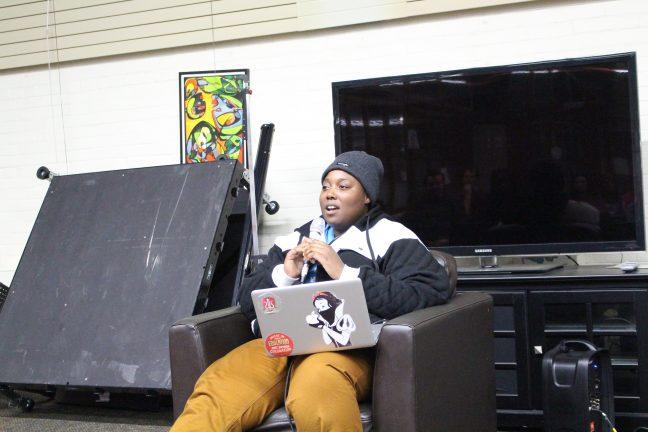Standing in front of a crowd of nearly 50 students, T. Banks, who is an organizer with Madison-based nonprofit Freedom Inc., spoke about the intersections of race, gender sexuality and violence Wednesday.
“You can’t be a raped, genderqueer schizophrenic, [according to the state, those identities] do not belong together,” Banks said.
Promoting Awareness, Victim Empowerment hosted an open mic night in the large, airy room of the Multicultural Student Center, where attendees were invited to share stories of gender-based violence and their processes of healing and creating safety.
Some expressed them through acapella, while others, like Banks, recited a poem.
Bank’s poem focused on how law enforcement viewed him. Titled “Taboo Life,” the poem highlighted Banks coming to terms with being a “black, trans, queer man with a disability” and how the “state” did not deem this intersection of identities as valid.
The concept of “state” in this case includes any entity that represents the government and its agents like police, Banks said.
While studying in Iowa and later at the University of Wisconsin, Banks said he faced several acts of violence, which only increased as he began identifying as a transgender man. Neither campus intervention nor law enforcement helped him in any way. In the poem, he said the state did not perceive the rape of a trans man the same way as the rape of a heterosexual individual.
Banks also spoke about being silenced for being a trans man. When he tried to talk to someone about the intimate partner violence in his relationship, he was told to simply “man up” and deal with his feelings.
“If you were the man, you’d shut [the violence] down,” Banks said.
Fade Horton, another participant, recited an excerpt from a monologue about how her parents reacted to her coming out as lesbian. Her father hit her in response and her mother kicked her out of the house.
But Banks said violence and discriminatory treatment did not just stop with gender.
In 2015, Cierra Finkley, a black 24-year-old woman from Madison, was arrested for fatally stabbing her boyfriend in an act of self-defense. Finkley, Banks said, had reported her boyfriend’s multiple acts of violence to the police but had not received any help.
One night when her boyfriend forcibly entered her house to assault her, she stabbed him and was immediately arrested.
“[Finkley’s case] reveals how, when you are black or of a marginalized identity, you may be blamed for just trying to survive,” Banks said.
Banks said he found ways to heal through writing and poetry. Calling the stage “the only place where people really heard me,” he said survivors can find their own ways to heal, but everyone needs to play an active role in helping them do so. Simply saying that one is an advocate is not enough.
Banks also emphasized community control and how that would allow for greater advocacy of each individual. He also encouraged people to talk to their elected officials and how “things need to change.”
“People who are most impacted — their voices should always be centered,” Banks said.


